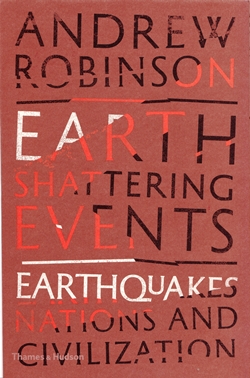
Not so long ago, geologists were reluctant to discuss asteroid impacts. They felt that appealing to extra-terrestrial agency was somehow – unscientific. It smacked of deus ex machina. It was just too easy - the sort of thing quacks and pseudoscientists like Velikovsky wrote about. Worse, it was straying into another chap’s discipline, which was simply not cricket.
We’re over that now. But as Andrew Robinson explains in his lively and readable synthesis, archaeologists still have a long way to go when it comes to explaining historical events in terms of GGEs – ‘Global Geophyscial Events’, like earthquakes and volcanic eruptions. Psychologically, he suggests, they are still where geologists were in AD 1979 – or if you like, ‘Year 1 BA’ (Before Alvarez). Archaeologists have yet to have their ‘iridium anomaly moment’ and until they do, they will go on preferring to talk in terms of climate changes, disease, invasion by mysterious ‘sea peoples’, crop failures, and other such admissibly gradualistic causes.
In this delightfully un-academic but thoughtfully structured book of 11 chapters plus conclusion, Robinson examines what people made of earthquakes before science, and what scientists made of them before seismology, before taking on some case histories, ancient and modern. He explores the crucial year 1750, when several quakes shook Britain and (just as meteorites, landing on professors in Siena instead of the usual peasants, in 1794, gave birth to meteoritics) caused great minds to consider anew the trembling of the Earth.
The Lisbon Earthquake of 1755 changed world history by putting an end to the Enlightenment’s Panglossian optimism, as is well known thanks to Voltaire. But much lesser-known conjunctions come into the picture, such as the Caracas earthquake of 1812 that helped give birth to Bolivia and changed the career of Simon Bolivar.
Naples was struck in 1857, from which Robinson dates the birth of seismology, while in 1906 San Francisco was the first modern city to be seismically destroyed. Robinson analyses the aftermath, and marvels, if that is the word, at the way in which the disaster was ‘spun’ by property boosters into one of destruction by fire, rather than the uninsurable Act of God.
As a similar fate befell Tokyo and Yokohama in 1923; while the Tangshan Earthquake of 1976 arguably put an end to old-style Maoist Communism in China. Gujarat (2001) played a crucial role in the rise from obscurity of current Indian Premier, Mr Narendra Modi, while the Indian Ocean Tsunami of 2004 showed the world what a GGE could really do. The consequences of the Fukushima Disaster, in which the real disaster was overshadowed by a much lesser event that nevertheless exposed the corruption and complacency of the Japanese nuclear industry (with potentially global consequences) bring this thought-provoking book to a worrying close.
Reviewed by Ted Nield
EARTH-SHATTERING EVENTS: EARTHQUAKES, NATIONS & CIVILIZATION by ANDREW ROBINSON. Thames & Hudson 2016. 256pp hbk ISBN 978-0-500-518595 W: www.thamesandhudson.com